Accounting Report: Ethical Dilemmas and Business Practices
VerifiedAdded on 2022/10/18
|13
|3273
|423
Report
AI Summary
This accounting report examines ethical dilemmas within a company struggling with wage issues. It analyzes the application of egoism, utilitarianism, and deontology by key figures like the COO and an accountant. The report explores the AAA model for ethical decision-making and the APES Code of Conduct. It highlights the ethical implications of the company's actions, contrasting the COO's self-interested behavior with the accountant's attempts to address the problems. The report assesses different options for the company, considering the consequences of each choice, and emphasizes the importance of ethical principles like integrity and objectivity in accounting practices. The analysis provides a comprehensive overview of the ethical challenges faced and the frameworks used to evaluate them.
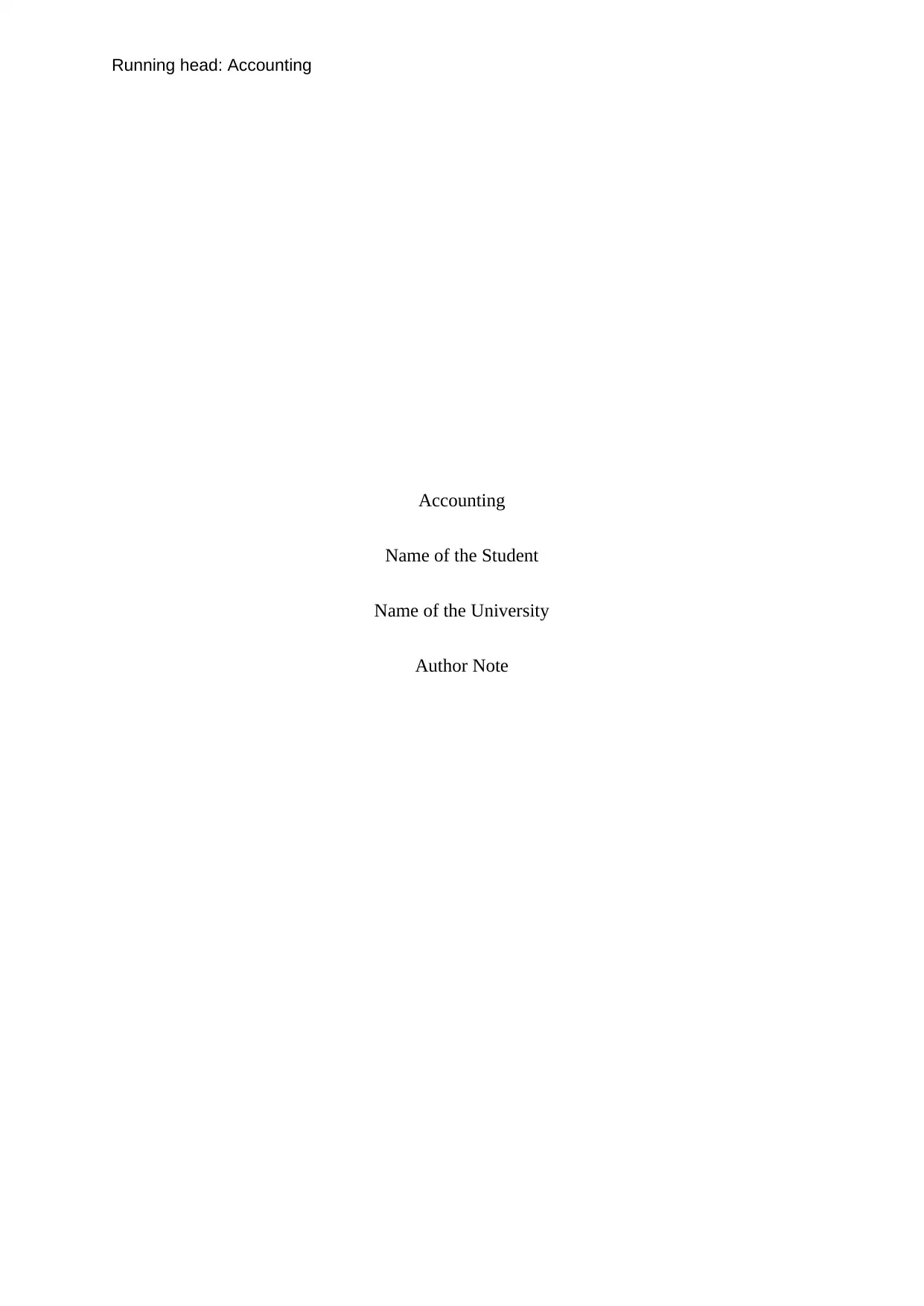
Running head: Accounting
Accounting
Name of the Student
Name of the University
Author Note
Accounting
Name of the Student
Name of the University
Author Note
Paraphrase This Document
Need a fresh take? Get an instant paraphrase of this document with our AI Paraphraser
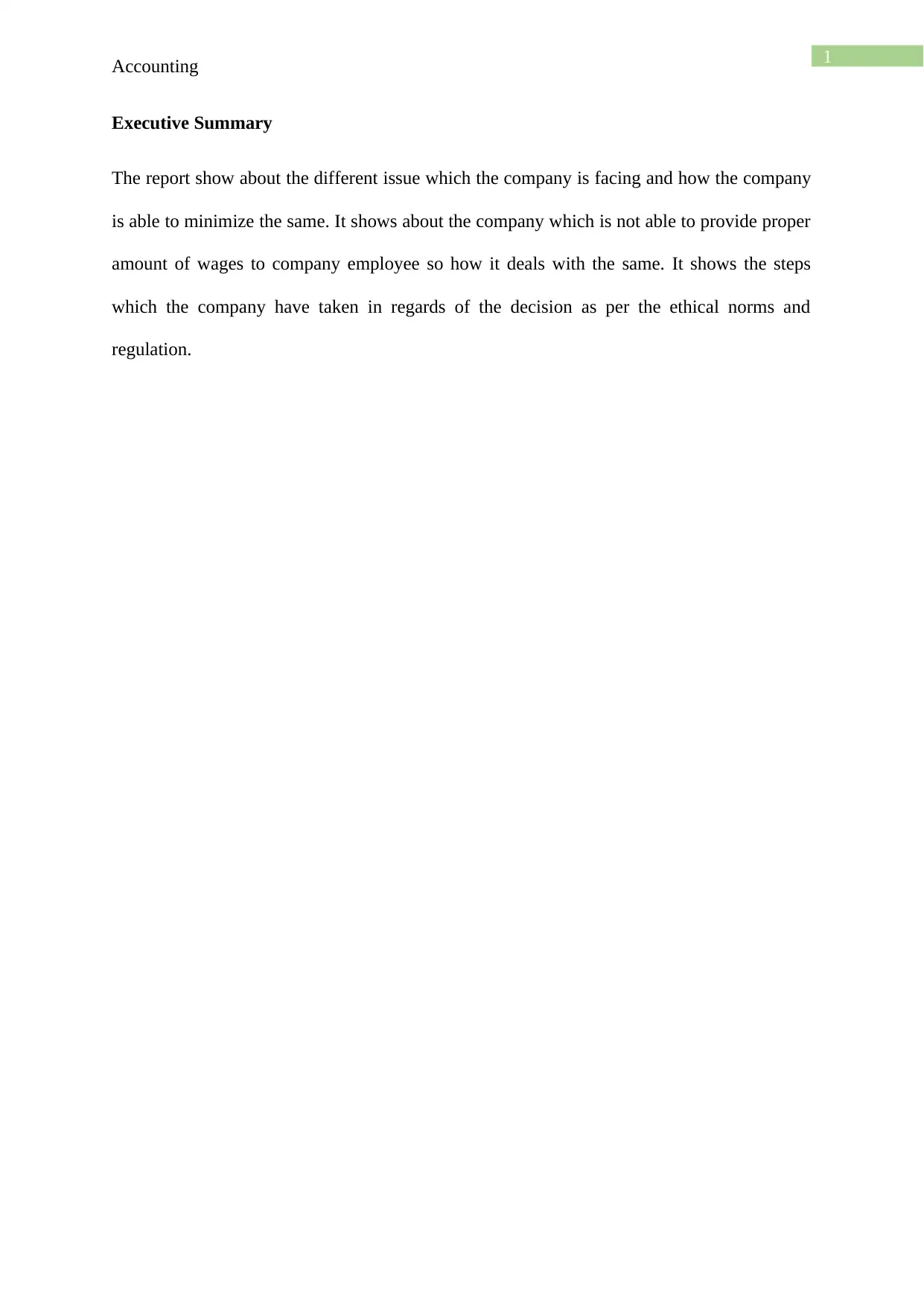
1
Accounting
Executive Summary
The report show about the different issue which the company is facing and how the company
is able to minimize the same. It shows about the company which is not able to provide proper
amount of wages to company employee so how it deals with the same. It shows the steps
which the company have taken in regards of the decision as per the ethical norms and
regulation.
Accounting
Executive Summary
The report show about the different issue which the company is facing and how the company
is able to minimize the same. It shows about the company which is not able to provide proper
amount of wages to company employee so how it deals with the same. It shows the steps
which the company have taken in regards of the decision as per the ethical norms and
regulation.
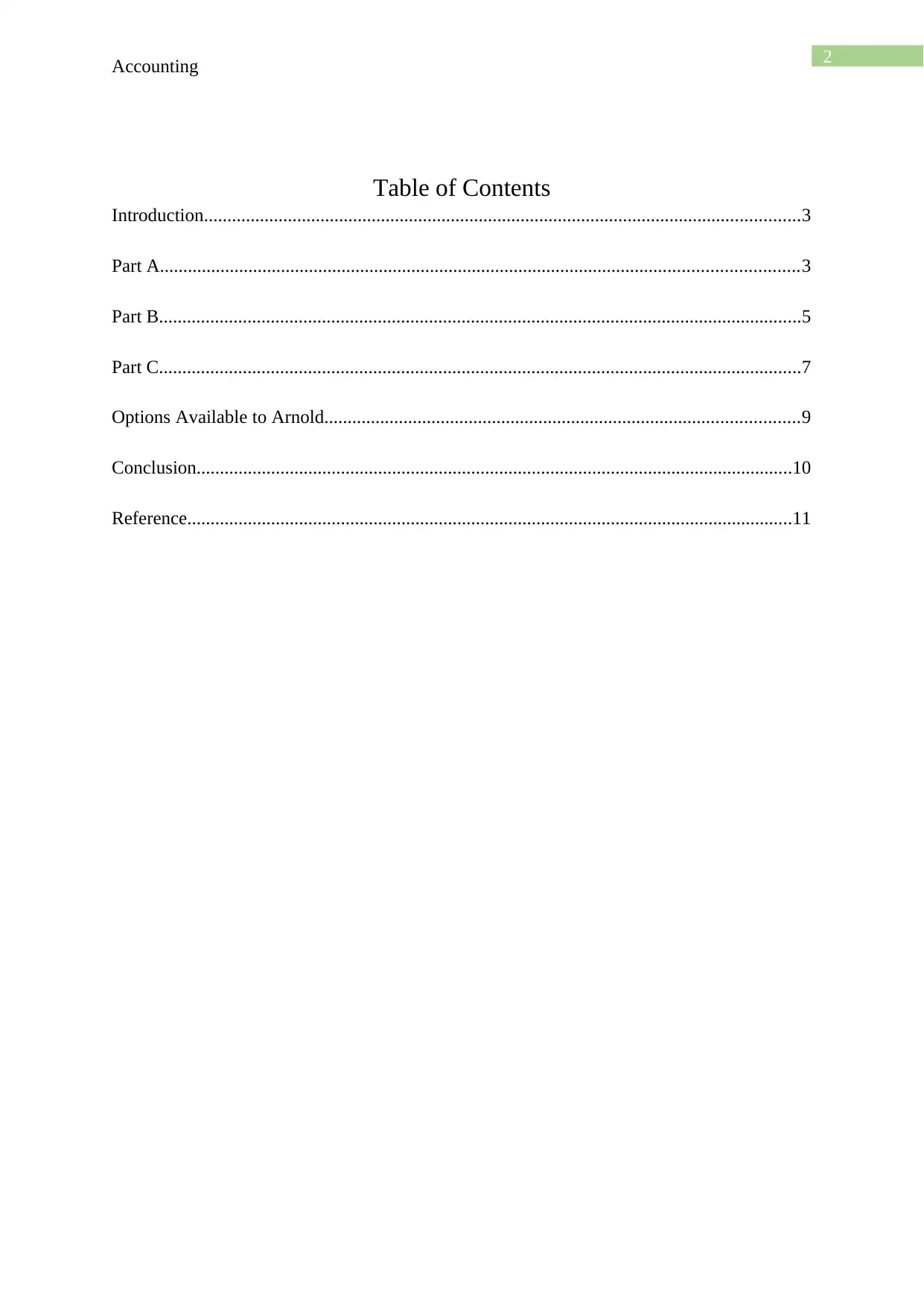
2
Accounting
Table of Contents
Introduction................................................................................................................................3
Part A.........................................................................................................................................3
Part B..........................................................................................................................................5
Part C..........................................................................................................................................7
Options Available to Arnold......................................................................................................9
Conclusion................................................................................................................................10
Reference..................................................................................................................................11
Accounting
Table of Contents
Introduction................................................................................................................................3
Part A.........................................................................................................................................3
Part B..........................................................................................................................................5
Part C..........................................................................................................................................7
Options Available to Arnold......................................................................................................9
Conclusion................................................................................................................................10
Reference..................................................................................................................................11
⊘ This is a preview!⊘
Do you want full access?
Subscribe today to unlock all pages.

Trusted by 1+ million students worldwide
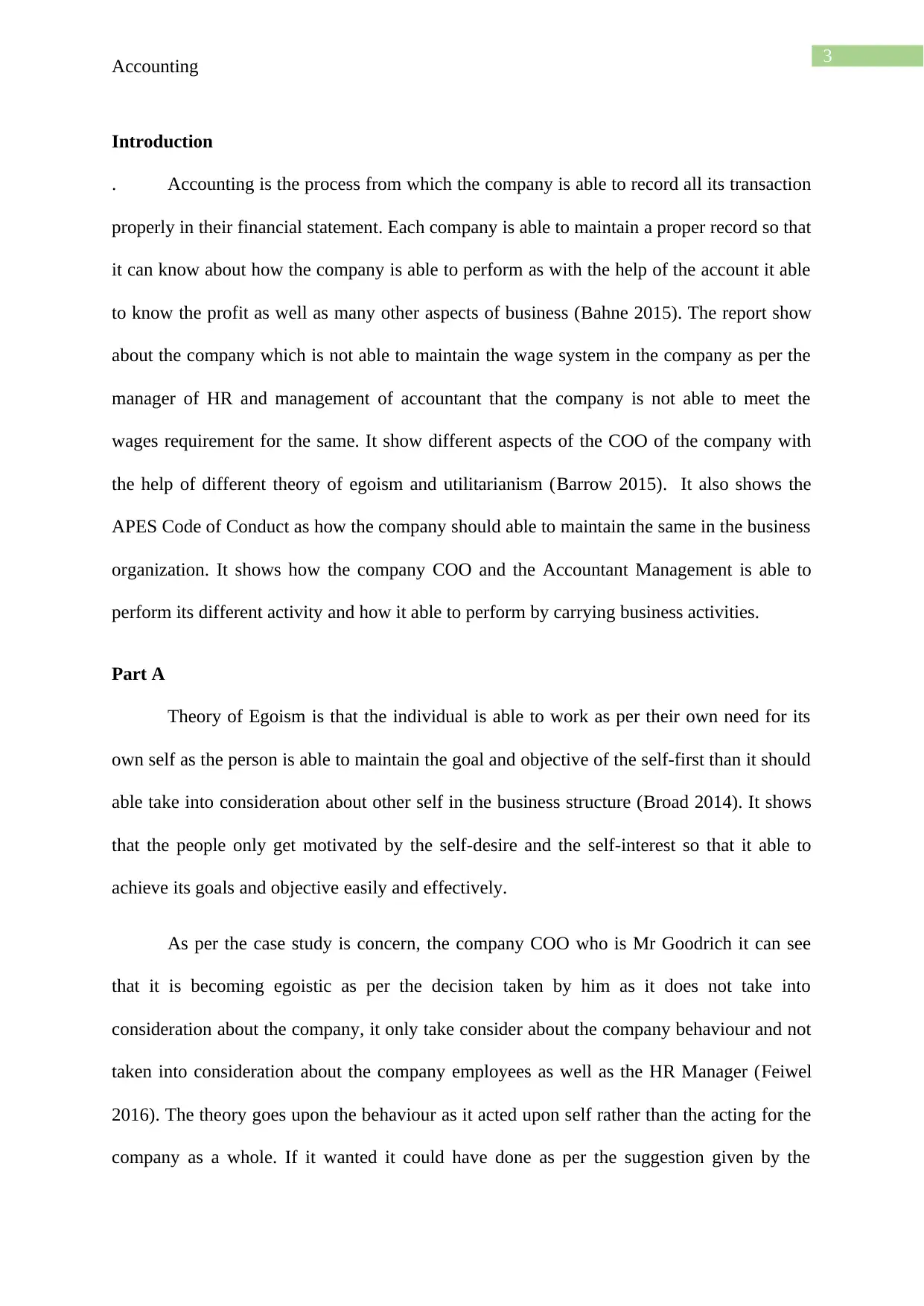
3
Accounting
Introduction
. Accounting is the process from which the company is able to record all its transaction
properly in their financial statement. Each company is able to maintain a proper record so that
it can know about how the company is able to perform as with the help of the account it able
to know the profit as well as many other aspects of business (Bahne 2015). The report show
about the company which is not able to maintain the wage system in the company as per the
manager of HR and management of accountant that the company is not able to meet the
wages requirement for the same. It show different aspects of the COO of the company with
the help of different theory of egoism and utilitarianism (Barrow 2015). It also shows the
APES Code of Conduct as how the company should able to maintain the same in the business
organization. It shows how the company COO and the Accountant Management is able to
perform its different activity and how it able to perform by carrying business activities.
Part A
Theory of Egoism is that the individual is able to work as per their own need for its
own self as the person is able to maintain the goal and objective of the self-first than it should
able take into consideration about other self in the business structure (Broad 2014). It shows
that the people only get motivated by the self-desire and the self-interest so that it able to
achieve its goals and objective easily and effectively.
As per the case study is concern, the company COO who is Mr Goodrich it can see
that it is becoming egoistic as per the decision taken by him as it does not take into
consideration about the company, it only take consider about the company behaviour and not
taken into consideration about the company employees as well as the HR Manager (Feiwel
2016). The theory goes upon the behaviour as it acted upon self rather than the acting for the
company as a whole. If it wanted it could have done as per the suggestion given by the
Accounting
Introduction
. Accounting is the process from which the company is able to record all its transaction
properly in their financial statement. Each company is able to maintain a proper record so that
it can know about how the company is able to perform as with the help of the account it able
to know the profit as well as many other aspects of business (Bahne 2015). The report show
about the company which is not able to maintain the wage system in the company as per the
manager of HR and management of accountant that the company is not able to meet the
wages requirement for the same. It show different aspects of the COO of the company with
the help of different theory of egoism and utilitarianism (Barrow 2015). It also shows the
APES Code of Conduct as how the company should able to maintain the same in the business
organization. It shows how the company COO and the Accountant Management is able to
perform its different activity and how it able to perform by carrying business activities.
Part A
Theory of Egoism is that the individual is able to work as per their own need for its
own self as the person is able to maintain the goal and objective of the self-first than it should
able take into consideration about other self in the business structure (Broad 2014). It shows
that the people only get motivated by the self-desire and the self-interest so that it able to
achieve its goals and objective easily and effectively.
As per the case study is concern, the company COO who is Mr Goodrich it can see
that it is becoming egoistic as per the decision taken by him as it does not take into
consideration about the company, it only take consider about the company behaviour and not
taken into consideration about the company employees as well as the HR Manager (Feiwel
2016). The theory goes upon the behaviour as it acted upon self rather than the acting for the
company as a whole. If it wanted it could have done as per the suggestion given by the
Paraphrase This Document
Need a fresh take? Get an instant paraphrase of this document with our AI Paraphraser
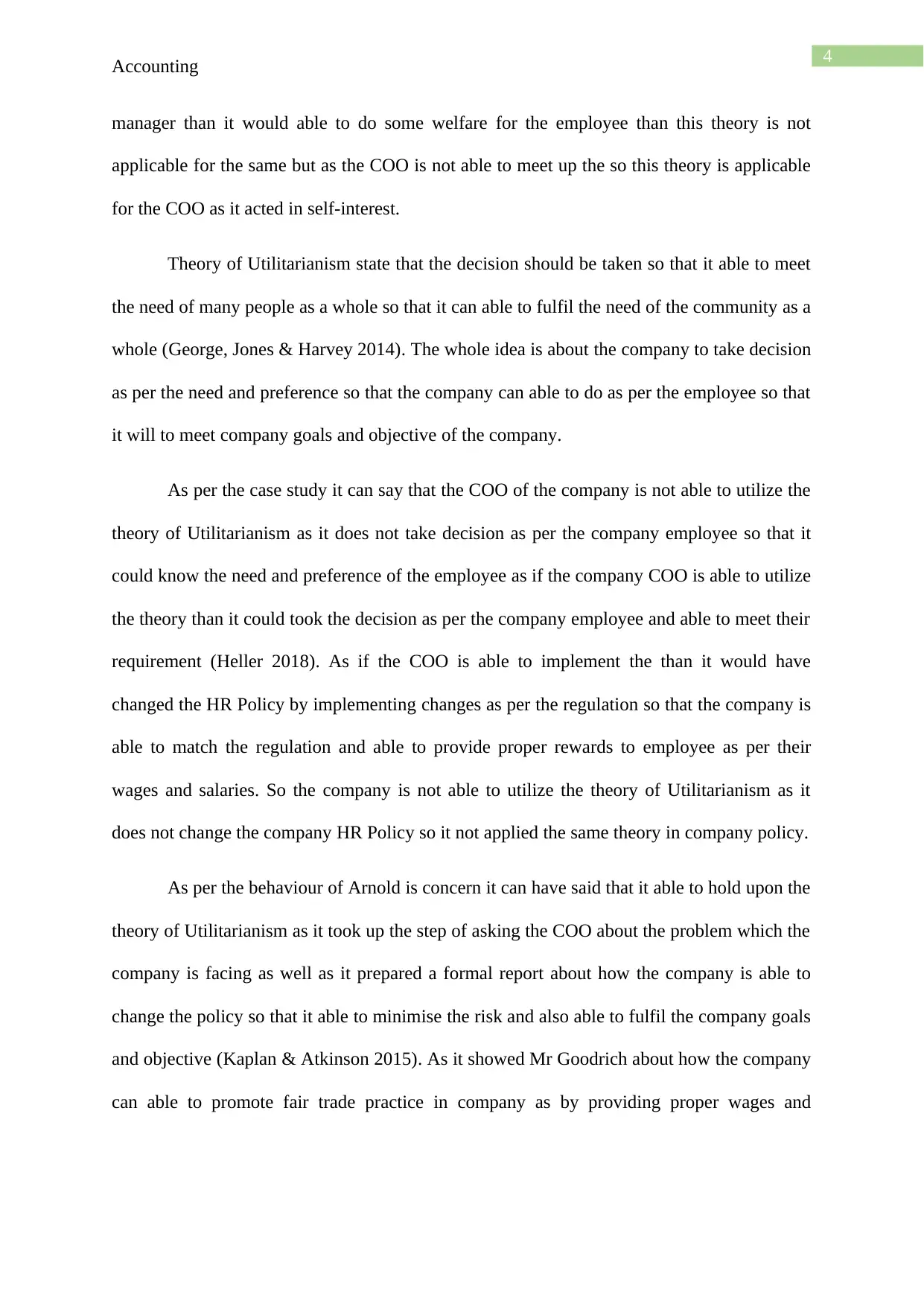
4
Accounting
manager than it would able to do some welfare for the employee than this theory is not
applicable for the same but as the COO is not able to meet up the so this theory is applicable
for the COO as it acted in self-interest.
Theory of Utilitarianism state that the decision should be taken so that it able to meet
the need of many people as a whole so that it can able to fulfil the need of the community as a
whole (George, Jones & Harvey 2014). The whole idea is about the company to take decision
as per the need and preference so that the company can able to do as per the employee so that
it will to meet company goals and objective of the company.
As per the case study it can say that the COO of the company is not able to utilize the
theory of Utilitarianism as it does not take decision as per the company employee so that it
could know the need and preference of the employee as if the company COO is able to utilize
the theory than it could took the decision as per the company employee and able to meet their
requirement (Heller 2018). As if the COO is able to implement the than it would have
changed the HR Policy by implementing changes as per the regulation so that the company is
able to match the regulation and able to provide proper rewards to employee as per their
wages and salaries. So the company is not able to utilize the theory of Utilitarianism as it
does not change the company HR Policy so it not applied the same theory in company policy.
As per the behaviour of Arnold is concern it can have said that it able to hold upon the
theory of Utilitarianism as it took up the step of asking the COO about the problem which the
company is facing as well as it prepared a formal report about how the company is able to
change the policy so that it able to minimise the risk and also able to fulfil the company goals
and objective (Kaplan & Atkinson 2015). As it showed Mr Goodrich about how the company
can able to promote fair trade practice in company as by providing proper wages and
Accounting
manager than it would able to do some welfare for the employee than this theory is not
applicable for the same but as the COO is not able to meet up the so this theory is applicable
for the COO as it acted in self-interest.
Theory of Utilitarianism state that the decision should be taken so that it able to meet
the need of many people as a whole so that it can able to fulfil the need of the community as a
whole (George, Jones & Harvey 2014). The whole idea is about the company to take decision
as per the need and preference so that the company can able to do as per the employee so that
it will to meet company goals and objective of the company.
As per the case study it can say that the COO of the company is not able to utilize the
theory of Utilitarianism as it does not take decision as per the company employee so that it
could know the need and preference of the employee as if the company COO is able to utilize
the theory than it could took the decision as per the company employee and able to meet their
requirement (Heller 2018). As if the COO is able to implement the than it would have
changed the HR Policy by implementing changes as per the regulation so that the company is
able to match the regulation and able to provide proper rewards to employee as per their
wages and salaries. So the company is not able to utilize the theory of Utilitarianism as it
does not change the company HR Policy so it not applied the same theory in company policy.
As per the behaviour of Arnold is concern it can have said that it able to hold upon the
theory of Utilitarianism as it took up the step of asking the COO about the problem which the
company is facing as well as it prepared a formal report about how the company is able to
change the policy so that it able to minimise the risk and also able to fulfil the company goals
and objective (Kaplan & Atkinson 2015). As it showed Mr Goodrich about how the company
can able to promote fair trade practice in company as by providing proper wages and
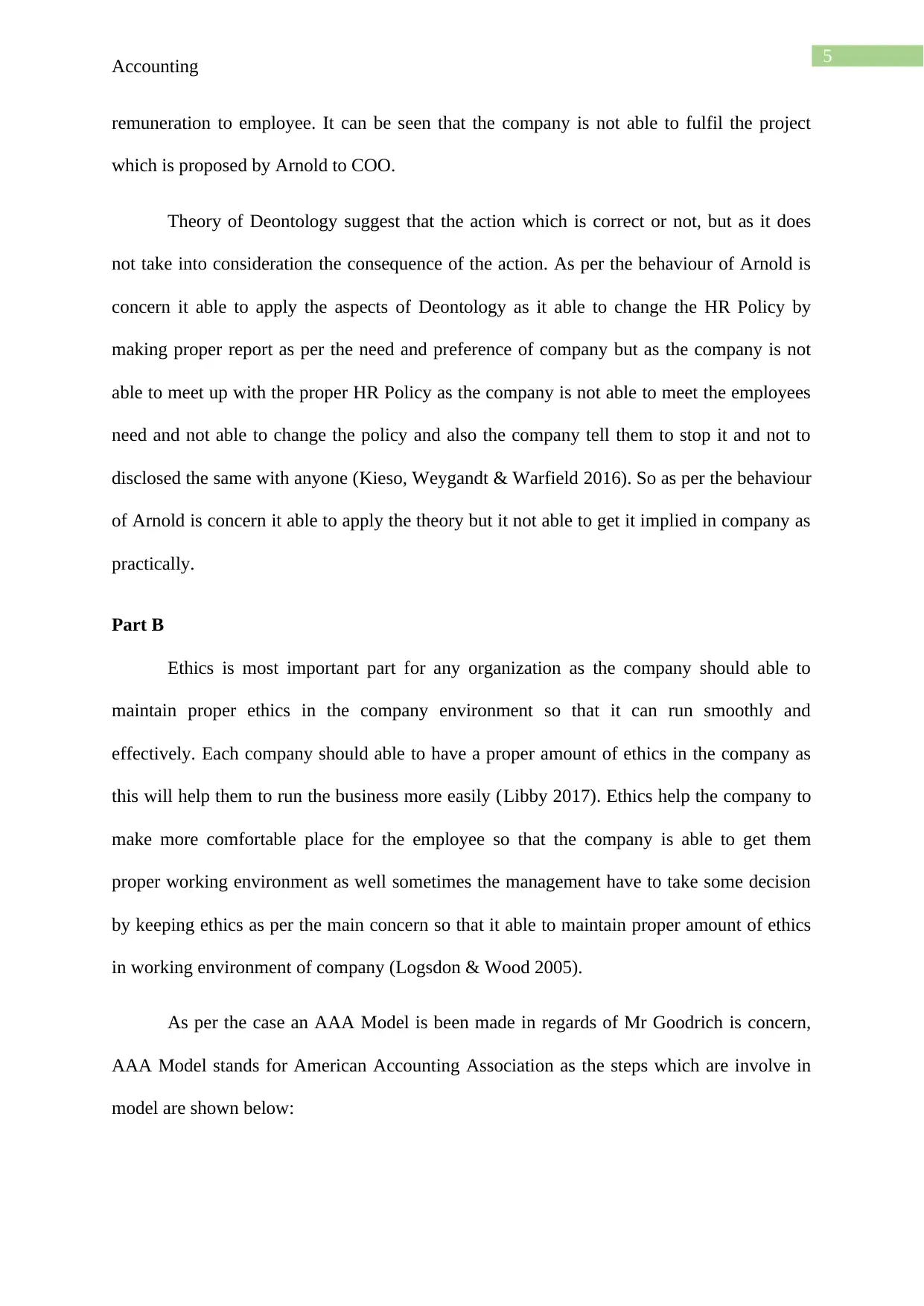
5
Accounting
remuneration to employee. It can be seen that the company is not able to fulfil the project
which is proposed by Arnold to COO.
Theory of Deontology suggest that the action which is correct or not, but as it does
not take into consideration the consequence of the action. As per the behaviour of Arnold is
concern it able to apply the aspects of Deontology as it able to change the HR Policy by
making proper report as per the need and preference of company but as the company is not
able to meet up with the proper HR Policy as the company is not able to meet the employees
need and not able to change the policy and also the company tell them to stop it and not to
disclosed the same with anyone (Kieso, Weygandt & Warfield 2016). So as per the behaviour
of Arnold is concern it able to apply the theory but it not able to get it implied in company as
practically.
Part B
Ethics is most important part for any organization as the company should able to
maintain proper ethics in the company environment so that it can run smoothly and
effectively. Each company should able to have a proper amount of ethics in the company as
this will help them to run the business more easily (Libby 2017). Ethics help the company to
make more comfortable place for the employee so that the company is able to get them
proper working environment as well sometimes the management have to take some decision
by keeping ethics as per the main concern so that it able to maintain proper amount of ethics
in working environment of company (Logsdon & Wood 2005).
As per the case an AAA Model is been made in regards of Mr Goodrich is concern,
AAA Model stands for American Accounting Association as the steps which are involve in
model are shown below:
Accounting
remuneration to employee. It can be seen that the company is not able to fulfil the project
which is proposed by Arnold to COO.
Theory of Deontology suggest that the action which is correct or not, but as it does
not take into consideration the consequence of the action. As per the behaviour of Arnold is
concern it able to apply the aspects of Deontology as it able to change the HR Policy by
making proper report as per the need and preference of company but as the company is not
able to meet up with the proper HR Policy as the company is not able to meet the employees
need and not able to change the policy and also the company tell them to stop it and not to
disclosed the same with anyone (Kieso, Weygandt & Warfield 2016). So as per the behaviour
of Arnold is concern it able to apply the theory but it not able to get it implied in company as
practically.
Part B
Ethics is most important part for any organization as the company should able to
maintain proper ethics in the company environment so that it can run smoothly and
effectively. Each company should able to have a proper amount of ethics in the company as
this will help them to run the business more easily (Libby 2017). Ethics help the company to
make more comfortable place for the employee so that the company is able to get them
proper working environment as well sometimes the management have to take some decision
by keeping ethics as per the main concern so that it able to maintain proper amount of ethics
in working environment of company (Logsdon & Wood 2005).
As per the case an AAA Model is been made in regards of Mr Goodrich is concern,
AAA Model stands for American Accounting Association as the steps which are involve in
model are shown below:
⊘ This is a preview!⊘
Do you want full access?
Subscribe today to unlock all pages.

Trusted by 1+ million students worldwide
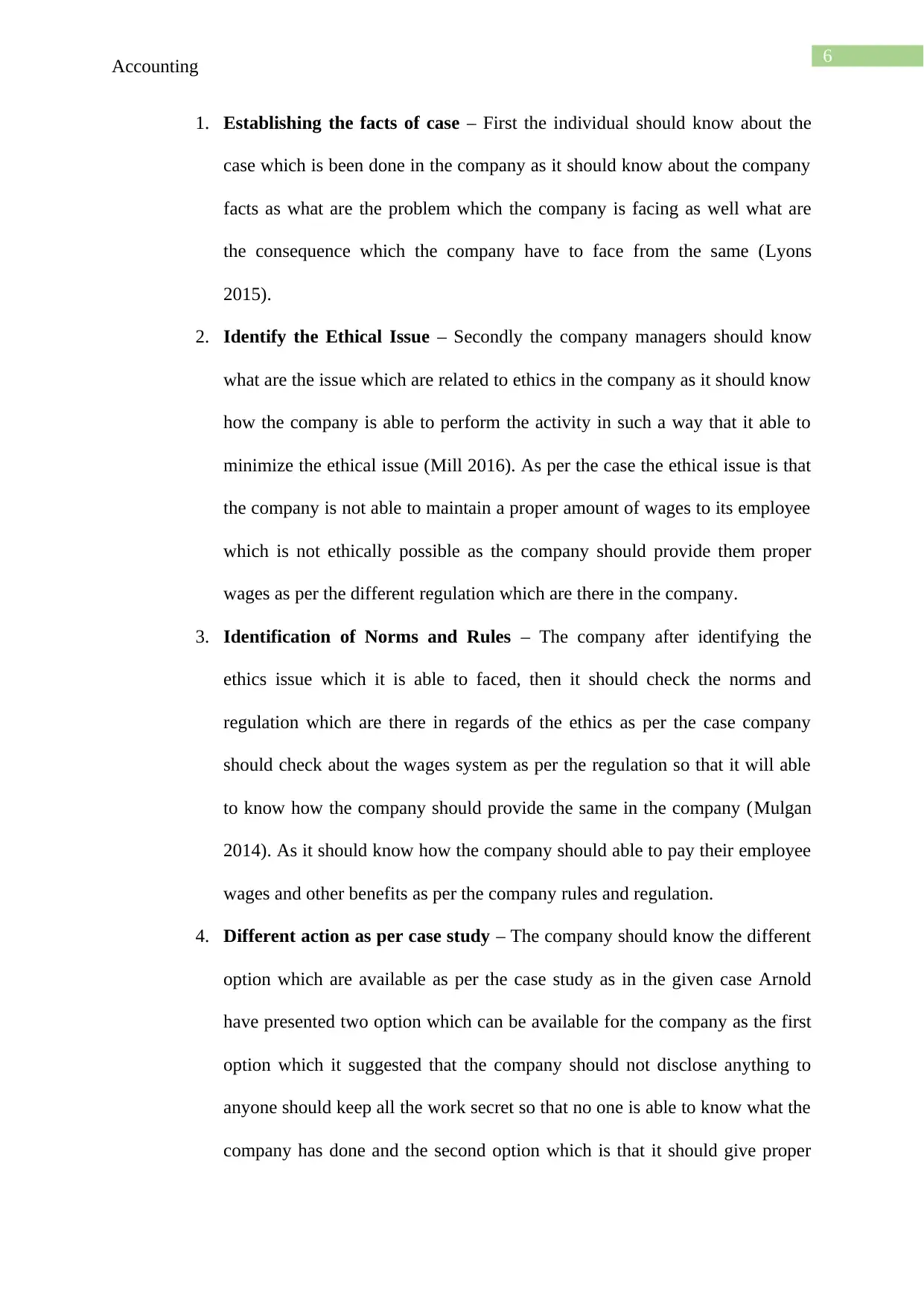
6
Accounting
1. Establishing the facts of case – First the individual should know about the
case which is been done in the company as it should know about the company
facts as what are the problem which the company is facing as well what are
the consequence which the company have to face from the same (Lyons
2015).
2. Identify the Ethical Issue – Secondly the company managers should know
what are the issue which are related to ethics in the company as it should know
how the company is able to perform the activity in such a way that it able to
minimize the ethical issue (Mill 2016). As per the case the ethical issue is that
the company is not able to maintain a proper amount of wages to its employee
which is not ethically possible as the company should provide them proper
wages as per the different regulation which are there in the company.
3. Identification of Norms and Rules – The company after identifying the
ethics issue which it is able to faced, then it should check the norms and
regulation which are there in regards of the ethics as per the case company
should check about the wages system as per the regulation so that it will able
to know how the company should provide the same in the company (Mulgan
2014). As it should know how the company should able to pay their employee
wages and other benefits as per the company rules and regulation.
4. Different action as per case study – The company should know the different
option which are available as per the case study as in the given case Arnold
have presented two option which can be available for the company as the first
option which it suggested that the company should not disclose anything to
anyone should keep all the work secret so that no one is able to know what the
company has done and the second option which is that it should give proper
Accounting
1. Establishing the facts of case – First the individual should know about the
case which is been done in the company as it should know about the company
facts as what are the problem which the company is facing as well what are
the consequence which the company have to face from the same (Lyons
2015).
2. Identify the Ethical Issue – Secondly the company managers should know
what are the issue which are related to ethics in the company as it should know
how the company is able to perform the activity in such a way that it able to
minimize the ethical issue (Mill 2016). As per the case the ethical issue is that
the company is not able to maintain a proper amount of wages to its employee
which is not ethically possible as the company should provide them proper
wages as per the different regulation which are there in the company.
3. Identification of Norms and Rules – The company after identifying the
ethics issue which it is able to faced, then it should check the norms and
regulation which are there in regards of the ethics as per the case company
should check about the wages system as per the regulation so that it will able
to know how the company should provide the same in the company (Mulgan
2014). As it should know how the company should able to pay their employee
wages and other benefits as per the company rules and regulation.
4. Different action as per case study – The company should know the different
option which are available as per the case study as in the given case Arnold
have presented two option which can be available for the company as the first
option which it suggested that the company should not disclose anything to
anyone should keep all the work secret so that no one is able to know what the
company has done and the second option which is that it should give proper
Paraphrase This Document
Need a fresh take? Get an instant paraphrase of this document with our AI Paraphraser
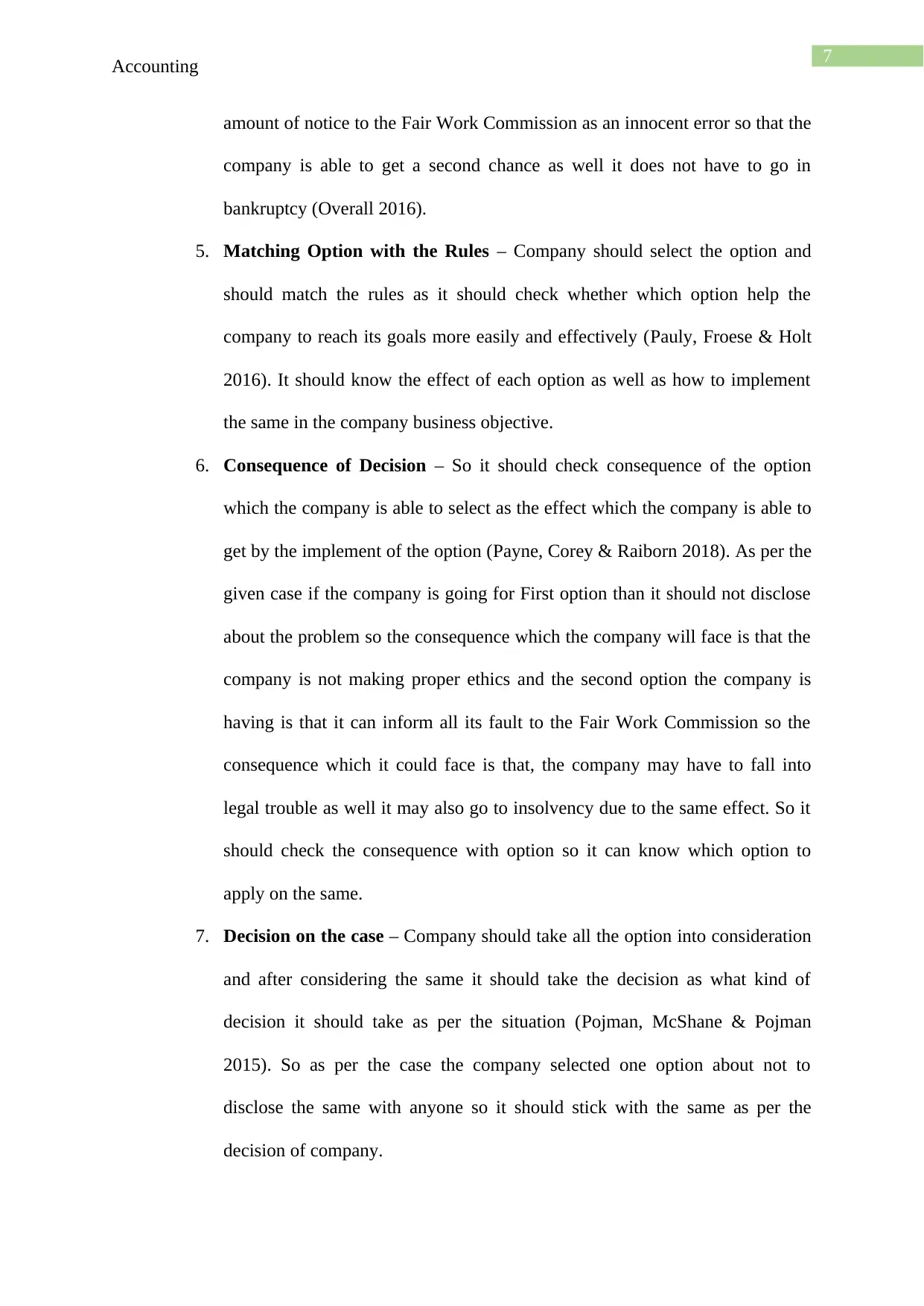
7
Accounting
amount of notice to the Fair Work Commission as an innocent error so that the
company is able to get a second chance as well it does not have to go in
bankruptcy (Overall 2016).
5. Matching Option with the Rules – Company should select the option and
should match the rules as it should check whether which option help the
company to reach its goals more easily and effectively (Pauly, Froese & Holt
2016). It should know the effect of each option as well as how to implement
the same in the company business objective.
6. Consequence of Decision – So it should check consequence of the option
which the company is able to select as the effect which the company is able to
get by the implement of the option (Payne, Corey & Raiborn 2018). As per the
given case if the company is going for First option than it should not disclose
about the problem so the consequence which the company will face is that the
company is not making proper ethics and the second option the company is
having is that it can inform all its fault to the Fair Work Commission so the
consequence which it could face is that, the company may have to fall into
legal trouble as well it may also go to insolvency due to the same effect. So it
should check the consequence with option so it can know which option to
apply on the same.
7. Decision on the case – Company should take all the option into consideration
and after considering the same it should take the decision as what kind of
decision it should take as per the situation (Pojman, McShane & Pojman
2015). So as per the case the company selected one option about not to
disclose the same with anyone so it should stick with the same as per the
decision of company.
Accounting
amount of notice to the Fair Work Commission as an innocent error so that the
company is able to get a second chance as well it does not have to go in
bankruptcy (Overall 2016).
5. Matching Option with the Rules – Company should select the option and
should match the rules as it should check whether which option help the
company to reach its goals more easily and effectively (Pauly, Froese & Holt
2016). It should know the effect of each option as well as how to implement
the same in the company business objective.
6. Consequence of Decision – So it should check consequence of the option
which the company is able to select as the effect which the company is able to
get by the implement of the option (Payne, Corey & Raiborn 2018). As per the
given case if the company is going for First option than it should not disclose
about the problem so the consequence which the company will face is that the
company is not making proper ethics and the second option the company is
having is that it can inform all its fault to the Fair Work Commission so the
consequence which it could face is that, the company may have to fall into
legal trouble as well it may also go to insolvency due to the same effect. So it
should check the consequence with option so it can know which option to
apply on the same.
7. Decision on the case – Company should take all the option into consideration
and after considering the same it should take the decision as what kind of
decision it should take as per the situation (Pojman, McShane & Pojman
2015). So as per the case the company selected one option about not to
disclose the same with anyone so it should stick with the same as per the
decision of company.
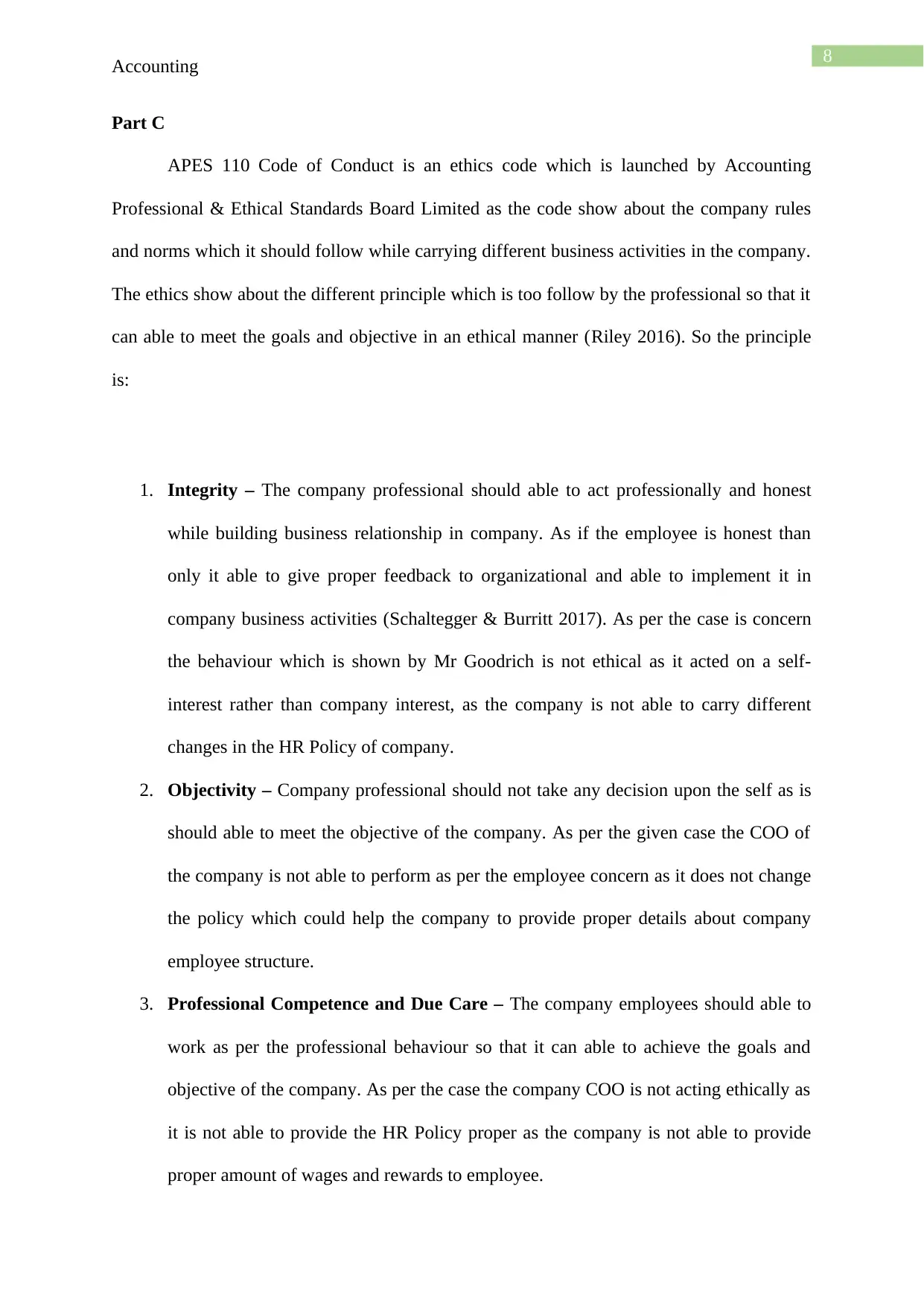
8
Accounting
Part C
APES 110 Code of Conduct is an ethics code which is launched by Accounting
Professional & Ethical Standards Board Limited as the code show about the company rules
and norms which it should follow while carrying different business activities in the company.
The ethics show about the different principle which is too follow by the professional so that it
can able to meet the goals and objective in an ethical manner (Riley 2016). So the principle
is:
1. Integrity – The company professional should able to act professionally and honest
while building business relationship in company. As if the employee is honest than
only it able to give proper feedback to organizational and able to implement it in
company business activities (Schaltegger & Burritt 2017). As per the case is concern
the behaviour which is shown by Mr Goodrich is not ethical as it acted on a self-
interest rather than company interest, as the company is not able to carry different
changes in the HR Policy of company.
2. Objectivity – Company professional should not take any decision upon the self as is
should able to meet the objective of the company. As per the given case the COO of
the company is not able to perform as per the employee concern as it does not change
the policy which could help the company to provide proper details about company
employee structure.
3. Professional Competence and Due Care – The company employees should able to
work as per the professional behaviour so that it can able to achieve the goals and
objective of the company. As per the case the company COO is not acting ethically as
it is not able to provide the HR Policy proper as the company is not able to provide
proper amount of wages and rewards to employee.
Accounting
Part C
APES 110 Code of Conduct is an ethics code which is launched by Accounting
Professional & Ethical Standards Board Limited as the code show about the company rules
and norms which it should follow while carrying different business activities in the company.
The ethics show about the different principle which is too follow by the professional so that it
can able to meet the goals and objective in an ethical manner (Riley 2016). So the principle
is:
1. Integrity – The company professional should able to act professionally and honest
while building business relationship in company. As if the employee is honest than
only it able to give proper feedback to organizational and able to implement it in
company business activities (Schaltegger & Burritt 2017). As per the case is concern
the behaviour which is shown by Mr Goodrich is not ethical as it acted on a self-
interest rather than company interest, as the company is not able to carry different
changes in the HR Policy of company.
2. Objectivity – Company professional should not take any decision upon the self as is
should able to meet the objective of the company. As per the given case the COO of
the company is not able to perform as per the employee concern as it does not change
the policy which could help the company to provide proper details about company
employee structure.
3. Professional Competence and Due Care – The company employees should able to
work as per the professional behaviour so that it can able to achieve the goals and
objective of the company. As per the case the company COO is not acting ethically as
it is not able to provide the HR Policy proper as the company is not able to provide
proper amount of wages and rewards to employee.
⊘ This is a preview!⊘
Do you want full access?
Subscribe today to unlock all pages.

Trusted by 1+ million students worldwide
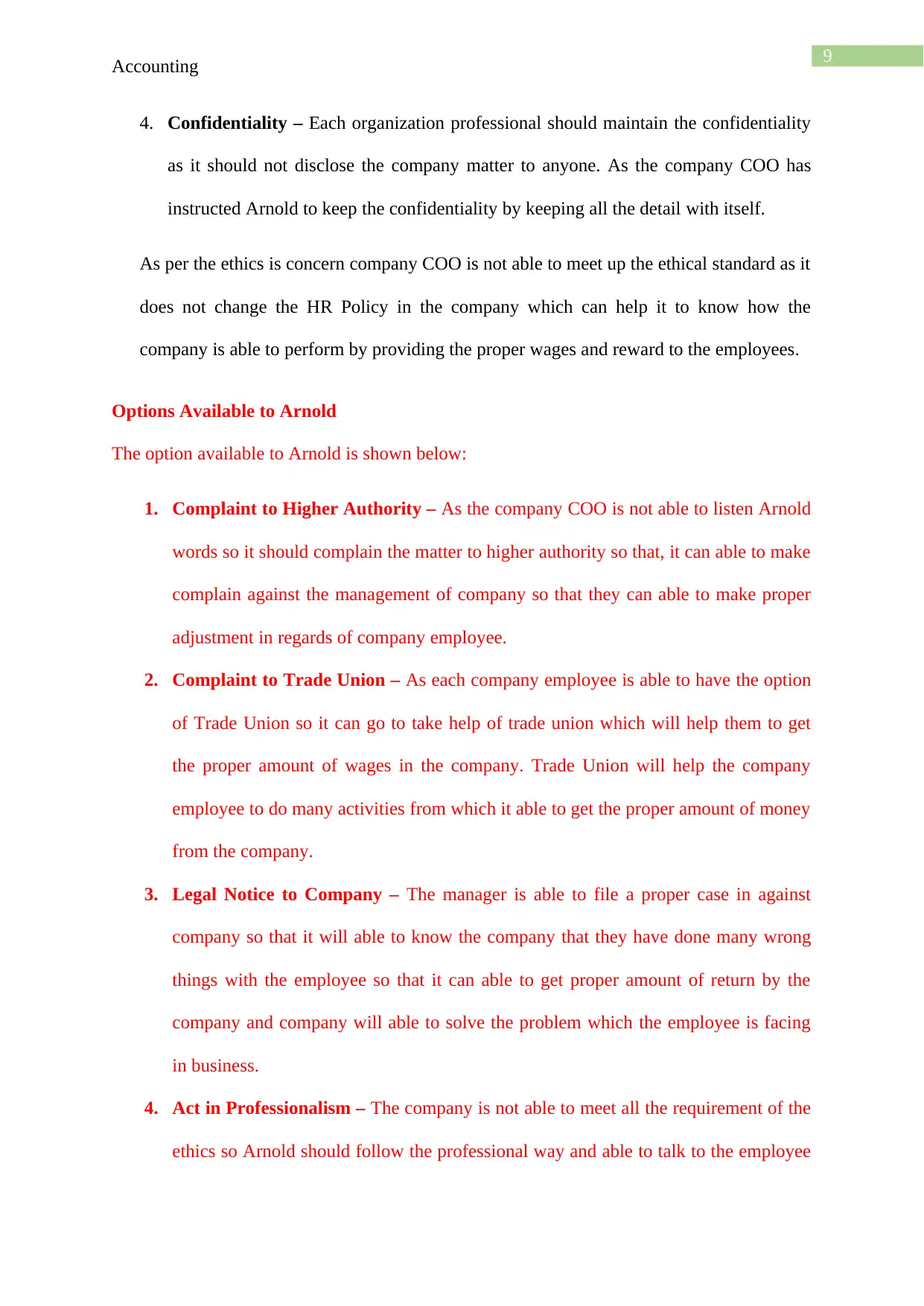
9
Accounting
4. Confidentiality – Each organization professional should maintain the confidentiality
as it should not disclose the company matter to anyone. As the company COO has
instructed Arnold to keep the confidentiality by keeping all the detail with itself.
As per the ethics is concern company COO is not able to meet up the ethical standard as it
does not change the HR Policy in the company which can help it to know how the
company is able to perform by providing the proper wages and reward to the employees.
Options Available to Arnold
The option available to Arnold is shown below:
1. Complaint to Higher Authority – As the company COO is not able to listen Arnold
words so it should complain the matter to higher authority so that, it can able to make
complain against the management of company so that they can able to make proper
adjustment in regards of company employee.
2. Complaint to Trade Union – As each company employee is able to have the option
of Trade Union so it can go to take help of trade union which will help them to get
the proper amount of wages in the company. Trade Union will help the company
employee to do many activities from which it able to get the proper amount of money
from the company.
3. Legal Notice to Company – The manager is able to file a proper case in against
company so that it will able to know the company that they have done many wrong
things with the employee so that it can able to get proper amount of return by the
company and company will able to solve the problem which the employee is facing
in business.
4. Act in Professionalism – The company is not able to meet all the requirement of the
ethics so Arnold should follow the professional way and able to talk to the employee
Accounting
4. Confidentiality – Each organization professional should maintain the confidentiality
as it should not disclose the company matter to anyone. As the company COO has
instructed Arnold to keep the confidentiality by keeping all the detail with itself.
As per the ethics is concern company COO is not able to meet up the ethical standard as it
does not change the HR Policy in the company which can help it to know how the
company is able to perform by providing the proper wages and reward to the employees.
Options Available to Arnold
The option available to Arnold is shown below:
1. Complaint to Higher Authority – As the company COO is not able to listen Arnold
words so it should complain the matter to higher authority so that, it can able to make
complain against the management of company so that they can able to make proper
adjustment in regards of company employee.
2. Complaint to Trade Union – As each company employee is able to have the option
of Trade Union so it can go to take help of trade union which will help them to get
the proper amount of wages in the company. Trade Union will help the company
employee to do many activities from which it able to get the proper amount of money
from the company.
3. Legal Notice to Company – The manager is able to file a proper case in against
company so that it will able to know the company that they have done many wrong
things with the employee so that it can able to get proper amount of return by the
company and company will able to solve the problem which the employee is facing
in business.
4. Act in Professionalism – The company is not able to meet all the requirement of the
ethics so Arnold should follow the professional way and able to talk to the employee
Paraphrase This Document
Need a fresh take? Get an instant paraphrase of this document with our AI Paraphraser
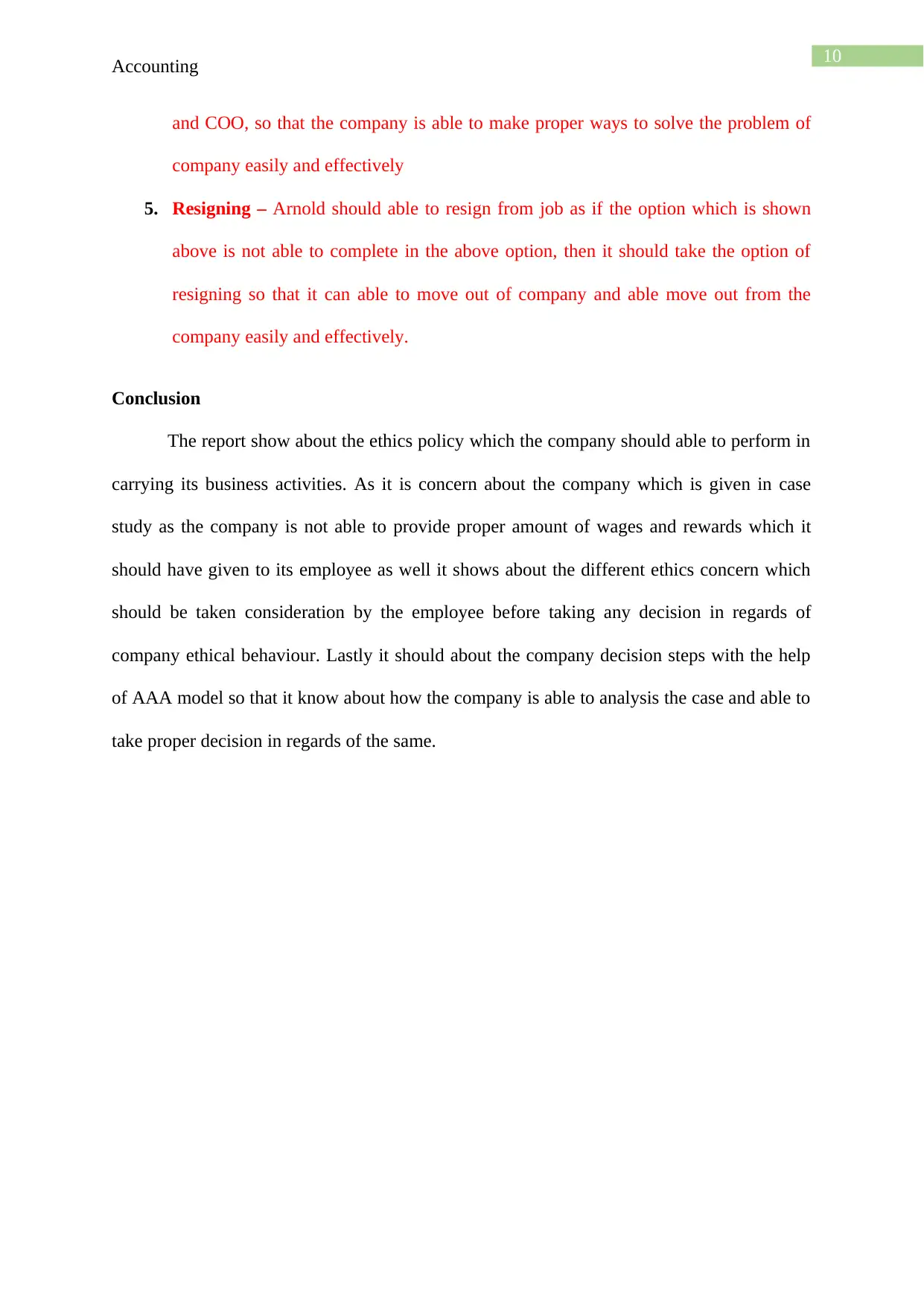
10
Accounting
and COO, so that the company is able to make proper ways to solve the problem of
company easily and effectively
5. Resigning – Arnold should able to resign from job as if the option which is shown
above is not able to complete in the above option, then it should take the option of
resigning so that it can able to move out of company and able move out from the
company easily and effectively.
Conclusion
The report show about the ethics policy which the company should able to perform in
carrying its business activities. As it is concern about the company which is given in case
study as the company is not able to provide proper amount of wages and rewards which it
should have given to its employee as well it shows about the different ethics concern which
should be taken consideration by the employee before taking any decision in regards of
company ethical behaviour. Lastly it should about the company decision steps with the help
of AAA model so that it know about how the company is able to analysis the case and able to
take proper decision in regards of the same.
Accounting
and COO, so that the company is able to make proper ways to solve the problem of
company easily and effectively
5. Resigning – Arnold should able to resign from job as if the option which is shown
above is not able to complete in the above option, then it should take the option of
resigning so that it can able to move out of company and able move out from the
company easily and effectively.
Conclusion
The report show about the ethics policy which the company should able to perform in
carrying its business activities. As it is concern about the company which is given in case
study as the company is not able to provide proper amount of wages and rewards which it
should have given to its employee as well it shows about the different ethics concern which
should be taken consideration by the employee before taking any decision in regards of
company ethical behaviour. Lastly it should about the company decision steps with the help
of AAA model so that it know about how the company is able to analysis the case and able to
take proper decision in regards of the same.
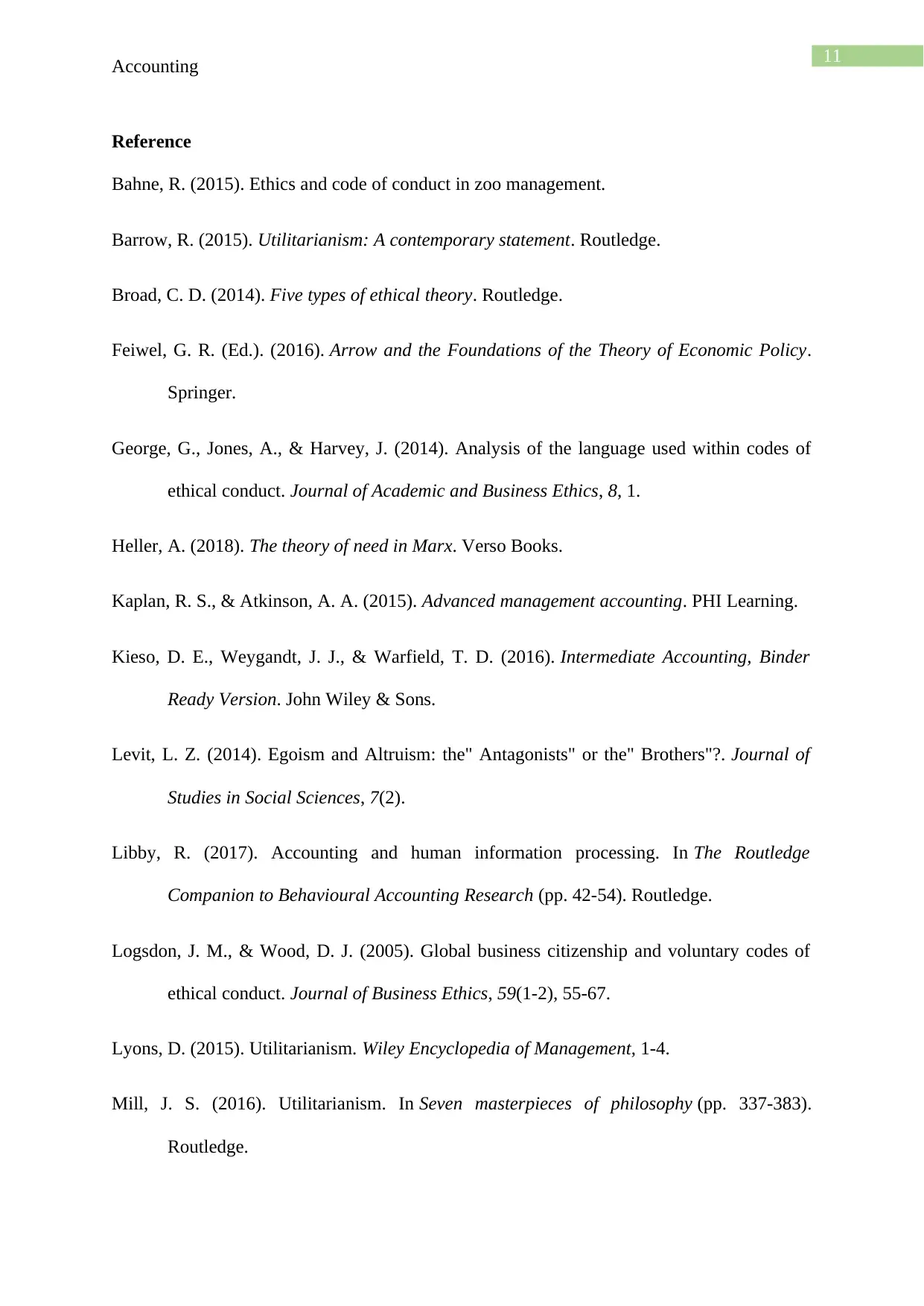
11
Accounting
Reference
Bahne, R. (2015). Ethics and code of conduct in zoo management.
Barrow, R. (2015). Utilitarianism: A contemporary statement. Routledge.
Broad, C. D. (2014). Five types of ethical theory. Routledge.
Feiwel, G. R. (Ed.). (2016). Arrow and the Foundations of the Theory of Economic Policy.
Springer.
George, G., Jones, A., & Harvey, J. (2014). Analysis of the language used within codes of
ethical conduct. Journal of Academic and Business Ethics, 8, 1.
Heller, A. (2018). The theory of need in Marx. Verso Books.
Kaplan, R. S., & Atkinson, A. A. (2015). Advanced management accounting. PHI Learning.
Kieso, D. E., Weygandt, J. J., & Warfield, T. D. (2016). Intermediate Accounting, Binder
Ready Version. John Wiley & Sons.
Levit, L. Z. (2014). Egoism and Altruism: the" Antagonists" or the" Brothers"?. Journal of
Studies in Social Sciences, 7(2).
Libby, R. (2017). Accounting and human information processing. In The Routledge
Companion to Behavioural Accounting Research (pp. 42-54). Routledge.
Logsdon, J. M., & Wood, D. J. (2005). Global business citizenship and voluntary codes of
ethical conduct. Journal of Business Ethics, 59(1-2), 55-67.
Lyons, D. (2015). Utilitarianism. Wiley Encyclopedia of Management, 1-4.
Mill, J. S. (2016). Utilitarianism. In Seven masterpieces of philosophy (pp. 337-383).
Routledge.
Accounting
Reference
Bahne, R. (2015). Ethics and code of conduct in zoo management.
Barrow, R. (2015). Utilitarianism: A contemporary statement. Routledge.
Broad, C. D. (2014). Five types of ethical theory. Routledge.
Feiwel, G. R. (Ed.). (2016). Arrow and the Foundations of the Theory of Economic Policy.
Springer.
George, G., Jones, A., & Harvey, J. (2014). Analysis of the language used within codes of
ethical conduct. Journal of Academic and Business Ethics, 8, 1.
Heller, A. (2018). The theory of need in Marx. Verso Books.
Kaplan, R. S., & Atkinson, A. A. (2015). Advanced management accounting. PHI Learning.
Kieso, D. E., Weygandt, J. J., & Warfield, T. D. (2016). Intermediate Accounting, Binder
Ready Version. John Wiley & Sons.
Levit, L. Z. (2014). Egoism and Altruism: the" Antagonists" or the" Brothers"?. Journal of
Studies in Social Sciences, 7(2).
Libby, R. (2017). Accounting and human information processing. In The Routledge
Companion to Behavioural Accounting Research (pp. 42-54). Routledge.
Logsdon, J. M., & Wood, D. J. (2005). Global business citizenship and voluntary codes of
ethical conduct. Journal of Business Ethics, 59(1-2), 55-67.
Lyons, D. (2015). Utilitarianism. Wiley Encyclopedia of Management, 1-4.
Mill, J. S. (2016). Utilitarianism. In Seven masterpieces of philosophy (pp. 337-383).
Routledge.
⊘ This is a preview!⊘
Do you want full access?
Subscribe today to unlock all pages.

Trusted by 1+ million students worldwide
1 out of 13
Related Documents
Your All-in-One AI-Powered Toolkit for Academic Success.
+13062052269
info@desklib.com
Available 24*7 on WhatsApp / Email
![[object Object]](/_next/static/media/star-bottom.7253800d.svg)
Unlock your academic potential
Copyright © 2020–2026 A2Z Services. All Rights Reserved. Developed and managed by ZUCOL.





